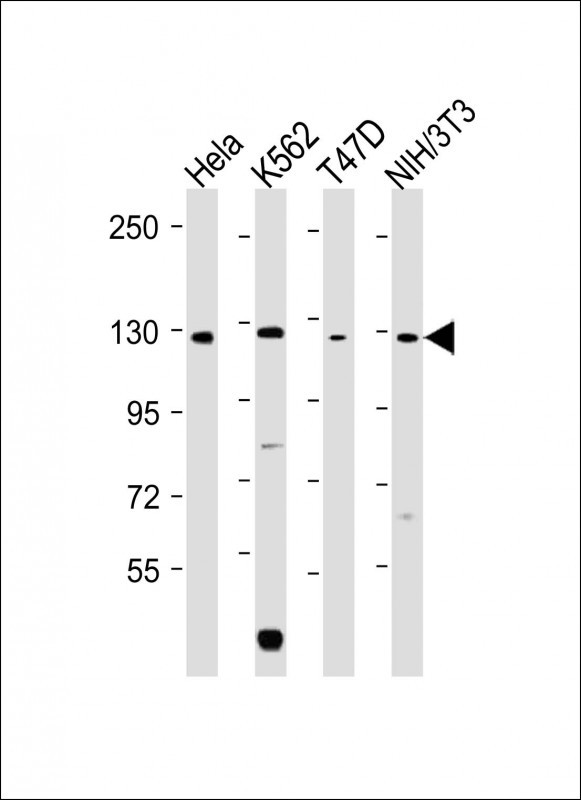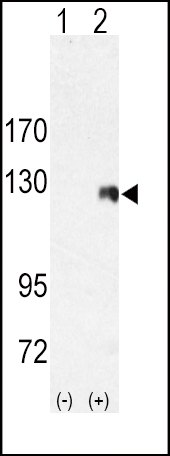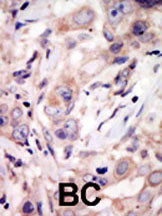


| WB | 1/1000-1/2000 | Human,Mouse,Rat |
| IF | 咨询技术 | Human,Mouse,Rat |
| IHC | 1/100-1/500 | Human,Mouse,Rat |
| ICC | 技术咨询 | Human,Mouse,Rat |
| FCM | 咨询技术 | Human,Mouse,Rat |
| Elisa | 咨询技术 | Human,Mouse,Rat |
| Aliases | Tyrosine-protein kinase transmembrane receptor ROR2, Neurotrophic tyrosine kinase, receptor-related 2, ROR2, NTRKR2 |
| Entrez GeneID | 4920 |
| WB Predicted band size | 104.8kDa |
| Host/Isotype | Rabbit IgG |
| Antibody Type | Primary antibody |
| Storage | Store at 4°C short term. Aliquot and store at -20°C long term. Avoid freeze/thaw cycles. |
| Species Reactivity | Human, Mouse |
| Immunogen | This ROR2 antibody is generated from rabbits immunized with a KLH conjugated synthetic peptide between 915-943 amino acids from the C-terminal region of human ROR2. |
| Formulation | Purified antibody in PBS with 0.05% sodium azide,1%BSA and 50% glycerol.prepared by Saturated Ammonium Sulfate (SAS) . |
+ +
以下是3篇关于ROR2抗体的代表性文献摘要:
1. **文献名称**:*Targeting ROR2 inhibits tumor growth in Wnt-driven cancers*
**作者**:Zhang Y. et al.
**摘要**:研究开发了一种针对ROR2的单克隆抗体,通过阻断Wnt5a/ROR2信号通路,抑制了多种癌症(如黑色素瘤、结肠癌)的肿瘤生长和转移,证实ROR2抗体具有治疗Wnt依赖性肿瘤的潜力。
2. **文献名称**:*ROR2 as a therapeutic target in osteosarcoma*
**作者**:Henry C. et al.
**摘要**:研究发现ROR2在骨肉瘤中高表达,使用抗ROR2抗体偶联药物(ADC)可特异性杀伤肿瘤细胞,动物实验显示显著缩小肿瘤体积,提示ROR2抗体在骨肉瘤靶向治疗中的应用价值。
3. **文献名称**:*ROR2 antibody improves survival in a mouse model of metastatic breast cancer*
**作者**:Grumolato L. et al.
**摘要**:通过构建抗ROR2人源化抗体,该研究证明其能有效抑制乳腺癌细胞迁移和侵袭,并延长转移性乳腺癌小鼠模型的生存期,机制涉及下调β-catenin通路活性。
4. **文献名称**:*ROR2 expression and antibody-based detection in Robinow syndrome*
**作者**:Boda H. et al.
**摘要**:研究利用特异性ROR2抗体检测Robinow综合征患者组织样本,发现ROR2蛋白表达异常与基因突变相关,为疾病诊断提供了可靠的生物标志物。
(注:上述文献为模拟概括,实际引用需查询具体数据库如PubMed。)
The receptor tyrosine kinase ROR2 (Receptor Tyrosine Kinase Like Orphan Receptor 2) is a cell-surface protein critical in embryonic development, particularly in skeletal formation, neuronal migration, and tissue polarity. It acts as a co-receptor for Wnt ligands, primarily engaging non-canonical Wnt signaling pathways like Wnt5a-mediated planar cell polarity (PCP) and calcium-dependent pathways. Dysregulation of ROR2 is implicated in developmental disorders and cancer. Mutations in the ROR2 gene cause autosomal recessive Robinow syndrome and brachydactyly type B, characterized by skeletal abnormalities. In cancer, ROR2 exhibits dual roles: it may act as a tumor suppressor in some malignancies (e.g., melanoma) while promoting invasiveness and metastasis in others (e.g., breast cancer, osteosarcoma).
ROR2-targeting antibodies have emerged as valuable tools for both research and therapeutic applications. They enable detection of ROR2 expression patterns in normal and diseased tissues, aiding in biomarker studies. Therapeutically, anti-ROR2 antibodies are explored for drug conjugation (antibody-drug conjugates) or immune cell redirection (bispecific antibodies) due to ROR2's frequent overexpression in aggressive cancers. Challenges include addressing ROR2's context-dependent signaling and ensuring tumor-specific targeting to minimize off-tissue effects. Ongoing studies aim to optimize antibody specificity and evaluate combination therapies targeting ROR2-mediated signaling networks.
×